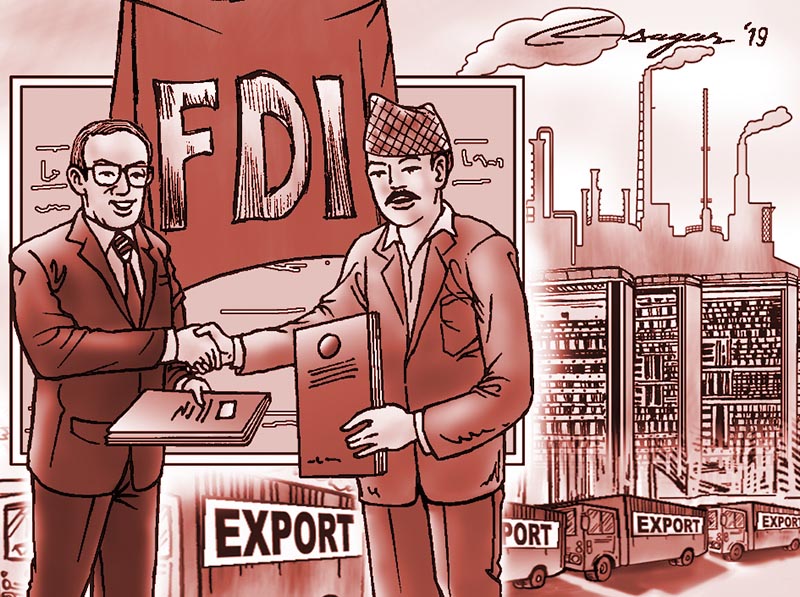Attracting FDI: Effective policies needed
Nepal has not been able to draw on the potential technological and other contributions that FDI can make to the development process. Many investors still complain that corruption, bureaucracy make investing in Nepal difficult
Foreign direct investment (FDI) has been playing an instrumental role in the economic development of developing countries. However, the ability to attract and to benefit from FDI varies a great deal since the socio-economic, institutional and cultural factors both enable and limit the host countries in their efforts to attract and benefit from FDI.
Many countries strive to attract FDI, hoping that the knowledge brought by the multinationals would spill over to the domestic industries and increase their productivity. On the macro side, FDI could spawn new economic sectors, push an economy’s technological frontier and diversify exports. On the micro side, through knowledge spillovers and linkages between foreign and domestic firms, FDI could foster technology transfer, improve managerial and employee skills, and boost investment incentives and productivity in upstream and downstream sectors.
Intensifying competition that results from a foreign entry could incentivise local firms to upgrade their productivity, drive out unproductive domestic firms and reallocate factors of production to more productive firms and uses.
An array of host country determinants influence FDI, such as economic, political and social stability, rules regarding entry and operations, market size, access to output markets, raw materials, skilled labour, transport and communication costs, investment promotion, tax rates and investment incentives. Other important factors include the absence of crime and corruption, basic and specialised infrastructure and the effectiveness and functionality of the financial sector.
An important role is played by institutional quality in determining FDI as low institutional quality denotes a higher cost of doing business and higher transaction costs. Similarly, macroeconomic stability is also a relevant driver of inward FDI. The absence of sharp fluctuations in inflation and exchange rates in the host country is a localisation advantage that can attract FDI by lowering the risks associated with the expected value of assets and profits made abroad.
However, FDI is not an automatic process, and policies also matter for reaping the full benefits of it. Foreign investors are influenced by certain factors - the return on their investment relative to the risks they are taking, especially political risks such as expropriation, convertibility and transfer restrictions and breach of contract by the sovereign; the ease with which subsidiaries’ operations in a given country can be integrated in the investor’s global strategies; and the overall quality of the host country’s enabling environment.
In recent years, Nepal has stepped up its efforts to improve its investment climate. In many cases, amendments in FDI regulations have liberalised restrictions, provided for non-discrimination between foreign and domestic private investors, allowed profit repatriation, protected against expropriation, granted incentives and strengthened standards of treatment of foreign investors. Still, it is important to further simplify the processes and procedures for operating a business so that the cobwebs of the
traditional bureaucratic and administrative system do not aggravate the cost of doing business in the country.
The FDI Policy 2015 is an indication of the government’s growing confidence to liberalise the economy as well as the need to supplement the development efforts of the government with international private sector participation. However, it should be equally realised that FDI is not a panacea for all development challenges because if it is not aligned to the country’s development priorities and if not managed properly, it can also create irreversible social, economic and environmental problems.
Nepal, so far, has not been able to draw on the potential technological and other contributions that FDI can make to the process of development. This underlines the need for effective policy interventions with a view to maximising the benefits of FDI in an open environment. At the present juncture, many foreign investors still complain that corruption, bureaucracy and a weak regulatory setting make investing in Nepal very difficult.
The country held its first Investment Summit in early March 2017, where 26 firms from eight countries pledged their investments of up to US$ 13.74 billion in the form of letters of intent. Most of these promises remain on paper only. To market Nepal as a lucrative investment destination
as well as to inform the investors about the political changes and the improvements in the investment climate, the government is organising a second Investment Summit on March 29, 2019.
It is imperative that the government and the private sector better understand the potential spillover benefits from FDI, particularly in how it helps increase the country’s and firm’s competitiveness. For this, the government will need to formulate an array of policies designed to enhance competitiveness, restructure the industrial base and support closer interface among the government, foreign investors and the domestic business community. The local private sector, on its part, will have to devise strategies to harness the technical and managerial capabilities of foreign firms.
Pant writes on globalisation and trade issues






